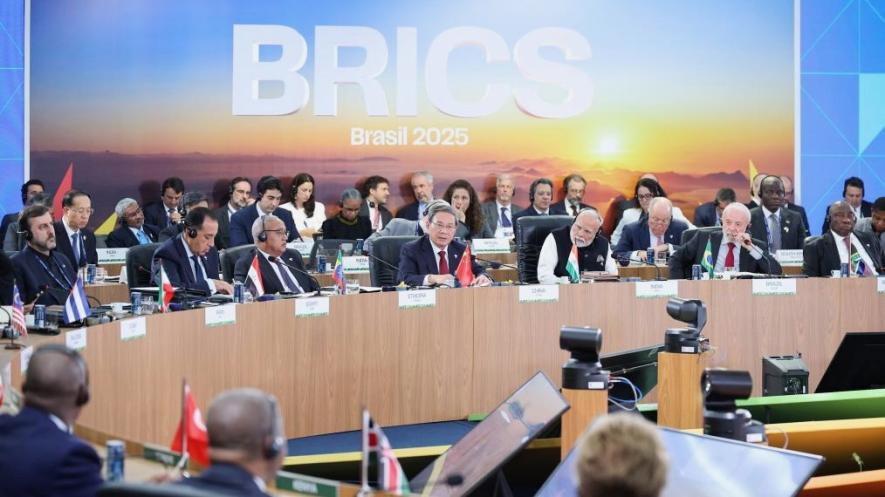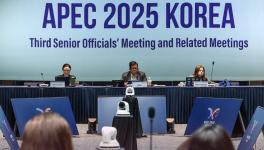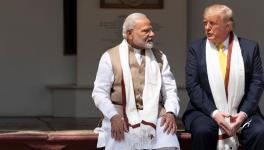BRICS Warns Unilateral Tariffs Will Harm Global Development

A plenary session of the 17th BRICS Summit in Rio de Janeiro, Brazil, July 6, 2025. Photo: Xinhua
The 17th BRICS summit, which concluded on Monday, July 7, in Rio de Janeiro, Brazil, resolved to oppose any form of “unilateral, punitive and discriminatory protectionist measures”, calling them harmful for global development.
BRICS members also expressed great concern about the “rise of unilateral tariff and non-tariff measures” because such moves distort global trade and violate the basic rules laid down by the World Trade Organization (WTO).
In its joint declaration adopted on the first day of the summit, BRICS leadersnoted that the “proliferation of trade restrictive actions, whether in the form of indiscriminate rising of tariffs and non-tarriff measures or protectionism under the guise of environmental objectives, threatens to further reduce global trade, disrupt global supply chains, and introduce uncertainty into international economic and trade activities.”
The bloc also stated that the indiscriminate use of tariff and non-tarriff barriers “potentially” exacerbates existing economic disparities between the rich and poor countries and affects prospects for global economic development.
Within hours after BRICS’ commitment to “rule based, open, transparent, fair” global trade was announced and its faith in the WTO was reiterated, US President Donald Trump warned all countries trying to align with the Global South bloc. He threatened members with an additional 10% tariff over and above those already announced as part of his so-called “reciprocal tariff regime” introduced in April.
“Any country aligning with the anti-American policies of BRICS will be charged an additional 10% tariff. There will be no exception to this policy,” Trump wrote in a social media post on Sunday.
Not against any particular country
Replying to Trump’s threats, the spokesperson for the Chinese Foreign Ministry, Mao Ning, told the press on Monday that BRICS does not target any particular country and instead focuses on “openness and win-win cooperation” among the emerging markets and developing countries.
Mao Ning also reiterated the Chinese position on Trump’s threats of more tariffs claiming that a “trade war and tariff war have no winners, and protectionism leads nowhere.”
Meanwhile, the implementation of Trump’s reciprocal tariff regime was extended until August 1 on Monday.
The US regime targeted scores of countries with high tariff rates in April but later postponed their implementation to July 9, apparently to allow countries to sign bilateral trade deals with the US.
Trump, after assuming office, had also threatened BRICS countries with high tariffs if they continued their efforts to create alternative mechanisms for trade payment or tried to undermine the American dollar by creating an alternative currency.
The BRICS countries, though, have claimed that the dominance of the US dollar in international trade and US-controlled payment systems have increasingly been misused to sustain political and economic hegemony. There is no consensus among the members about forming a new global currency.
However, BRICS has been working on developing an alternative payment mechanism to keep their mutual trade safe from the unilateral actions of the US.
BRICS countries have called for increased reliance on their own countries in mutual trade and the development of an independent payment mechanism.
Several leaders during the summit in Brazil reiterated the need to find ways to reduce reliance on the US dollar and US-controlled payment mechanisms.
Bolivian President Luis Arce, for example, emphasized that BRICS must give up the US dollar and use national currencies for mutual trade, RT reported on Monday.
Similar points were made by Malaysian Prime Minister Anwar Ibrahim. Bolivia and Malaysia have joined as two of the ten new BRICS “partner” countries.
In the joint declaration issued on Sunday, BRICS countries mentioned their growing emphasis on the use of local currencies in mutual trade. They also noted the progress in developing their cross-border payment initiative hoping that it will soon be fully operational.
Courtesy: Peoples Dispatch
Get the latest reports & analysis with people's perspective on Protests, movements & deep analytical videos, discussions of the current affairs in your Telegram app. Subscribe to NewsClick's Telegram channel & get Real-Time updates on stories, as they get published on our website.
























